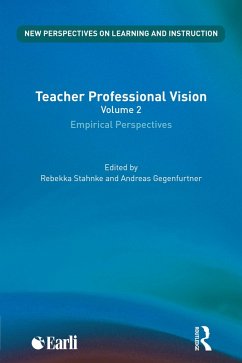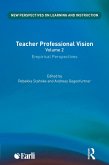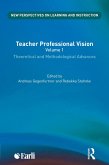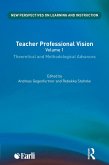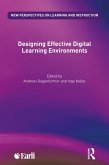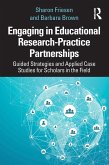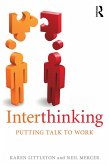Teacher Professional Vision: Empirical Perspectives (eBook, ePUB)
Redaktion: Stahnke, Rebekka; Gegenfurtner, Andreas
39,95 €
39,95 €
inkl. MwSt.
Sofort per Download lieferbar

20 °P sammeln
39,95 €
Als Download kaufen

39,95 €
inkl. MwSt.
Sofort per Download lieferbar

20 °P sammeln
Jetzt verschenken
Alle Infos zum eBook verschenken
39,95 €
inkl. MwSt.
Sofort per Download lieferbar
Alle Infos zum eBook verschenken

20 °P sammeln
Teacher Professional Vision: Empirical Perspectives (eBook, ePUB)
Redaktion: Stahnke, Rebekka; Gegenfurtner, Andreas
- Format: ePub
- Merkliste
- Auf die Merkliste
- Bewerten Bewerten
- Teilen
- Produkt teilen
- Produkterinnerung
- Produkterinnerung

Bitte loggen Sie sich zunächst in Ihr Kundenkonto ein oder registrieren Sie sich bei
bücher.de, um das eBook-Abo tolino select nutzen zu können.
Hier können Sie sich einloggen
Hier können Sie sich einloggen
Sie sind bereits eingeloggt. Klicken Sie auf 2. tolino select Abo, um fortzufahren.

Bitte loggen Sie sich zunächst in Ihr Kundenkonto ein oder registrieren Sie sich bei bücher.de, um das eBook-Abo tolino select nutzen zu können.
This two-part edited volume explores new theoretical models, emerging methods and empirical findings. Volume II provides insights into research on teacher professional vision across different domains, including equity, classroom management and subject teaching across school levels (from elementary school to higher education).
- Geräte: eReader
- mit Kopierschutz
- eBook Hilfe
- Größe: 9.33MB
Andere Kunden interessierten sich auch für
![Teacher Professional Vision: Empirical Perspectives (eBook, PDF) Teacher Professional Vision: Empirical Perspectives (eBook, PDF)]() Teacher Professional Vision: Empirical Perspectives (eBook, PDF)39,95 €
Teacher Professional Vision: Empirical Perspectives (eBook, PDF)39,95 €![Teacher Professional Vision: Theoretical and Methodological Advances (eBook, ePUB) Teacher Professional Vision: Theoretical and Methodological Advances (eBook, ePUB)]() Teacher Professional Vision: Theoretical and Methodological Advances (eBook, ePUB)39,95 €
Teacher Professional Vision: Theoretical and Methodological Advances (eBook, ePUB)39,95 €![Teacher Professional Vision: Theoretical and Methodological Advances (eBook, PDF) Teacher Professional Vision: Theoretical and Methodological Advances (eBook, PDF)]() Teacher Professional Vision: Theoretical and Methodological Advances (eBook, PDF)39,95 €
Teacher Professional Vision: Theoretical and Methodological Advances (eBook, PDF)39,95 €![Designing Effective Digital Learning Environments (eBook, ePUB) Designing Effective Digital Learning Environments (eBook, ePUB)]() Designing Effective Digital Learning Environments (eBook, ePUB)35,95 €
Designing Effective Digital Learning Environments (eBook, ePUB)35,95 €![Engaging in Educational Research-Practice Partnerships (eBook, ePUB) Engaging in Educational Research-Practice Partnerships (eBook, ePUB)]() Sharon FriesenEngaging in Educational Research-Practice Partnerships (eBook, ePUB)34,95 €
Sharon FriesenEngaging in Educational Research-Practice Partnerships (eBook, ePUB)34,95 €![Inspiring Purpose in High-Performance Schooling (eBook, ePUB) Inspiring Purpose in High-Performance Schooling (eBook, ePUB)]() Mary Anne HengInspiring Purpose in High-Performance Schooling (eBook, ePUB)38,95 €
Mary Anne HengInspiring Purpose in High-Performance Schooling (eBook, ePUB)38,95 €![Interthinking: Putting talk to work (eBook, ePUB) Interthinking: Putting talk to work (eBook, ePUB)]() Karen LittletonInterthinking: Putting talk to work (eBook, ePUB)38,95 €
Karen LittletonInterthinking: Putting talk to work (eBook, ePUB)38,95 €-
-
-
This two-part edited volume explores new theoretical models, emerging methods and empirical findings. Volume II provides insights into research on teacher professional vision across different domains, including equity, classroom management and subject teaching across school levels (from elementary school to higher education).
Hinweis: Dieser Artikel kann nur an eine deutsche Lieferadresse ausgeliefert werden.
Dieser Download kann aus rechtlichen Gründen nur mit Rechnungsadresse in A, B, BG, CY, CZ, D, DK, EW, E, FIN, F, GR, HR, H, IRL, I, LT, L, LR, M, NL, PL, P, R, S, SLO, SK ausgeliefert werden.
Hinweis: Dieser Artikel kann nur an eine deutsche Lieferadresse ausgeliefert werden.
Produktdetails
- Produktdetails
- Verlag: Taylor & Francis eBooks
- Erscheinungstermin: 30. Dezember 2024
- Englisch
- ISBN-13: 9781040272824
- Artikelnr.: 72249398
- Verlag: Taylor & Francis eBooks
- Erscheinungstermin: 30. Dezember 2024
- Englisch
- ISBN-13: 9781040272824
- Artikelnr.: 72249398
- Herstellerkennzeichnung Die Herstellerinformationen sind derzeit nicht verfügbar.
Rebekka Stahnke is a postdoctoral researcher at the IPN - Leibniz Institute for Science and Mathematics Education in Berlin, Germany. Her research interests include teacher professional vision, classroom management, and teacher professional development. Andreas Gegenfurtner is Professor for Methods in Learning Research at the University of Augsburg. His research focuses on teacher noticing, student diversity, digital learning, and the confluence of expertise, training, and development in the professions.
Introduction to empirical perspectives on teacher professional vision;
Part I - On the development of teacher professional vision and its
socio-cultural context; 1. An exploration of noticing discourse as a
mechanism of teacher learning; 2. Knowledge, self-efficacy, and
professional vision: How do they predict pre-service teachers' peer
feedback quality?; 3. Characterizing novice and expert teachers'
professional vision of classroom management; 4. The role of experts' norms
of instructional quality for assessing teacher noticing: Revealing
culture-specific and interculturally shared norms of mathematics education
in Germany and Taiwan; 5. Heterogenous student characteristics as a
challenge in professional noticing of teachers in diagnostic judgment
situations; Part II - Subject-specific perspectives on teacher professional
vision; 6. Teacher noticing regarding aspects of instructional quality in
the mathematics classroom; 7. Professional vision in science classrooms; 8.
Pre-service history teachers' professional vision: Findings from a
video-based longitudinal study; 9. Beyond the surface: A qualitative study
on professional vision of deep structures within geography education; 10.
Professional vision in German as a Second Language (GSL) teacher education:
A digital video observation aid for noticing GSL micro-scaffolding and
teachers' language use; 11. Perception and teaching in visual arts; 12.
Beyond the visual: Professional perception in the general music classroom;
13. Facilitating professional vision of domain-specific critical incidents
in religious education; 14. Development and validation of a test to measure
situation-specific skills with regard to providing participation in
inclusive physical education; Part III - Teacher professional vison in
early childhood and higher education; 15. Illustrations as item stimuli to
asses early childhood teachers' situation-specific skills - a promising
approach?; 16. The interaction between professional vision and conceptual
change in higher education teaching - self-reports, videos, and eye
tracking as study methods; Part IV - Discussion; 17. Avenues for future
research on teacher noticing and professional vision
Part I - On the development of teacher professional vision and its
socio-cultural context; 1. An exploration of noticing discourse as a
mechanism of teacher learning; 2. Knowledge, self-efficacy, and
professional vision: How do they predict pre-service teachers' peer
feedback quality?; 3. Characterizing novice and expert teachers'
professional vision of classroom management; 4. The role of experts' norms
of instructional quality for assessing teacher noticing: Revealing
culture-specific and interculturally shared norms of mathematics education
in Germany and Taiwan; 5. Heterogenous student characteristics as a
challenge in professional noticing of teachers in diagnostic judgment
situations; Part II - Subject-specific perspectives on teacher professional
vision; 6. Teacher noticing regarding aspects of instructional quality in
the mathematics classroom; 7. Professional vision in science classrooms; 8.
Pre-service history teachers' professional vision: Findings from a
video-based longitudinal study; 9. Beyond the surface: A qualitative study
on professional vision of deep structures within geography education; 10.
Professional vision in German as a Second Language (GSL) teacher education:
A digital video observation aid for noticing GSL micro-scaffolding and
teachers' language use; 11. Perception and teaching in visual arts; 12.
Beyond the visual: Professional perception in the general music classroom;
13. Facilitating professional vision of domain-specific critical incidents
in religious education; 14. Development and validation of a test to measure
situation-specific skills with regard to providing participation in
inclusive physical education; Part III - Teacher professional vison in
early childhood and higher education; 15. Illustrations as item stimuli to
asses early childhood teachers' situation-specific skills - a promising
approach?; 16. The interaction between professional vision and conceptual
change in higher education teaching - self-reports, videos, and eye
tracking as study methods; Part IV - Discussion; 17. Avenues for future
research on teacher noticing and professional vision
Introduction to empirical perspectives on teacher professional vision;
Part I - On the development of teacher professional vision and its
socio-cultural context; 1. An exploration of noticing discourse as a
mechanism of teacher learning; 2. Knowledge, self-efficacy, and
professional vision: How do they predict pre-service teachers' peer
feedback quality?; 3. Characterizing novice and expert teachers'
professional vision of classroom management; 4. The role of experts' norms
of instructional quality for assessing teacher noticing: Revealing
culture-specific and interculturally shared norms of mathematics education
in Germany and Taiwan; 5. Heterogenous student characteristics as a
challenge in professional noticing of teachers in diagnostic judgment
situations; Part II - Subject-specific perspectives on teacher professional
vision; 6. Teacher noticing regarding aspects of instructional quality in
the mathematics classroom; 7. Professional vision in science classrooms; 8.
Pre-service history teachers' professional vision: Findings from a
video-based longitudinal study; 9. Beyond the surface: A qualitative study
on professional vision of deep structures within geography education; 10.
Professional vision in German as a Second Language (GSL) teacher education:
A digital video observation aid for noticing GSL micro-scaffolding and
teachers' language use; 11. Perception and teaching in visual arts; 12.
Beyond the visual: Professional perception in the general music classroom;
13. Facilitating professional vision of domain-specific critical incidents
in religious education; 14. Development and validation of a test to measure
situation-specific skills with regard to providing participation in
inclusive physical education; Part III - Teacher professional vison in
early childhood and higher education; 15. Illustrations as item stimuli to
asses early childhood teachers' situation-specific skills - a promising
approach?; 16. The interaction between professional vision and conceptual
change in higher education teaching - self-reports, videos, and eye
tracking as study methods; Part IV - Discussion; 17. Avenues for future
research on teacher noticing and professional vision
Part I - On the development of teacher professional vision and its
socio-cultural context; 1. An exploration of noticing discourse as a
mechanism of teacher learning; 2. Knowledge, self-efficacy, and
professional vision: How do they predict pre-service teachers' peer
feedback quality?; 3. Characterizing novice and expert teachers'
professional vision of classroom management; 4. The role of experts' norms
of instructional quality for assessing teacher noticing: Revealing
culture-specific and interculturally shared norms of mathematics education
in Germany and Taiwan; 5. Heterogenous student characteristics as a
challenge in professional noticing of teachers in diagnostic judgment
situations; Part II - Subject-specific perspectives on teacher professional
vision; 6. Teacher noticing regarding aspects of instructional quality in
the mathematics classroom; 7. Professional vision in science classrooms; 8.
Pre-service history teachers' professional vision: Findings from a
video-based longitudinal study; 9. Beyond the surface: A qualitative study
on professional vision of deep structures within geography education; 10.
Professional vision in German as a Second Language (GSL) teacher education:
A digital video observation aid for noticing GSL micro-scaffolding and
teachers' language use; 11. Perception and teaching in visual arts; 12.
Beyond the visual: Professional perception in the general music classroom;
13. Facilitating professional vision of domain-specific critical incidents
in religious education; 14. Development and validation of a test to measure
situation-specific skills with regard to providing participation in
inclusive physical education; Part III - Teacher professional vison in
early childhood and higher education; 15. Illustrations as item stimuli to
asses early childhood teachers' situation-specific skills - a promising
approach?; 16. The interaction between professional vision and conceptual
change in higher education teaching - self-reports, videos, and eye
tracking as study methods; Part IV - Discussion; 17. Avenues for future
research on teacher noticing and professional vision
